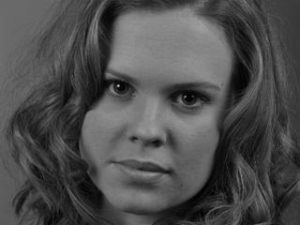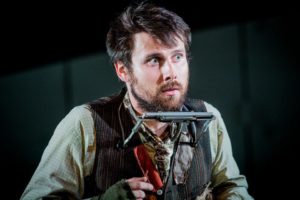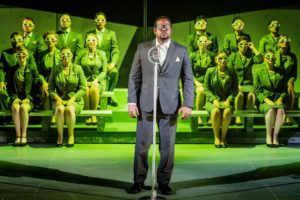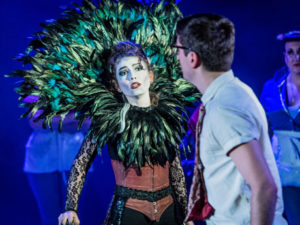 (4 / 5)
(4 / 5)
Mozart’s “The Magic Flute” which recently finished its short run at The Sherman Theatre in Cardiff, is an accomplished and often very funny interpretation presented by The Royal Welsh College of Music and Drama.
Prince Tamino, (tenor Huw Ynyr) is rescued from a serpent by Three Ladies, attendants on the Queen of the Night, (soprano Bernice Chitiul). She promises Tamino the hand of her daughter Pamina, (soprano – Lucy Mellors), if he can rescue her from the hands of the evil Sarastro, (bass – Blaise Malaba), who has kidnapped her. Together with the Royal Birdcatcher Papageno, (baritone – Dragos Ionel), they go off on search of the unfortunate Pamina. They have been granted two magical instruments to accompany them on their dangerous journey. Tamino is given a flute, personified onstage by Andrew Martin, and Papageno bells in the shape of xylophonist James Harris.
The remainder of the action depicts the rescue attempt and the trials and tribulations forced upon Tamino and Papageno to effect the rescue.
Mozart was a Freemason, and symbolism and ritual are shown in this opera in a thinly veiled allegoric way. Masonic themes such as good vs. evil, enlightenment vs. ignorance, and the virtues of knowledge, justice, wisdom and truth are all here. The mysterious worship of Isis and Osiris, Egyptian Gods concerned with the Afterlife, and a libretto by Emanuel Schikaneder is full of symbols and rituals associated with Freemasonry. The number three which has a strong association with Freemasonry features strongly as well. Witness the Three Lady attendants of the Queen of the Night, the Three Boys in their flying machines that guide our two heroes in the rescue attempt and the serpent that is cut into three pieces are just some of the references to this number in the opera.
Director Martin Constandine has an impressive c.v. having previously worked with The Royal Opera House, RSC, English National Opera, WNO and a host of other influential companies. On the basis of what is on display in this production, you can clearly see why this is the case.
In his version, Sarastro is the leader of a totalitarian cult, (suitably named The Brotherhood), whose subjects are brainwashed on a daily basis to render them zombie-like in their passivity.
Masonic symbols abound although chevrons are, I believe, more associated with The Illuminati.
In one highly comic scene, the clones are transformed from their usual catatonic state into a dance troupe doing the twist upon reacting to the magical effects of the bells.
Chad Healy’s busy set design works well. At the opening to Act 2, the curtain opens to a number of girls in a typing pool and then in the upper back section a scene of a clone receiving their daily dose of “medication” contrasts brilliantly.
Huw Ynyr has a very pleasant tenor voice. He also sings with great clarity. This version is in English written by Jeremy Sams.
Likewise Lucy Mellors has a very fine soprano voice. Her aria after Tamino refuses to speak to her, (one of the trials he must pass in order to gain admission to The Brotherhood), Tamino, see, these tears flow for you alone, beloved is sung with great sincerity and intensity.
Dragos Ionel’s Papageno, has a resonable baritone voice, but he excels in his comedic acting.
Blaise Malaba as Sarasto looked the part as the arch-baddie commanding an ominous presence on stage. His bass singing may lack a little power in the deepest range, but in other respects he is excellent.
Bernice Chitiul as Queen of the Night rendered a performance of the highest order. It didn’t surprise me when reading the programme notes that she has performed at London’s Wigmore Hall. Her two arias, both technically difficult showed her ability as being able to master the coloratura skill required.
The Three Boys and The Three Lady Attendant offer admirable support.
The orchestra of the RWCMD under the baton of Gareth Jones, play Mozart’s score with the lightness and fluency required and complement the singing perfectly.
There are many future stars in the world of opera on view in this production, and one hopes that it will tour in the future so that audiences can enjoy to-notch opera at a very reasonable price.
Roger Barrington






